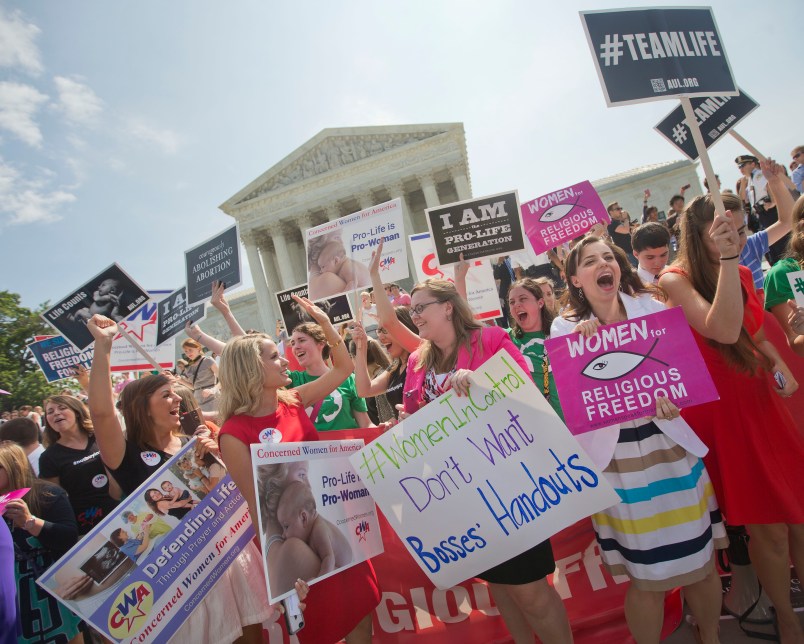Ten weeks after Hobby Lobby, the Supreme Court’s landmark ruling has emboldened a swath of separate legal attacks on birth control, many of which experts say have a real chance of succeeding.
In a case heard in an appeals court court this week, a Missouri state representative named Paul Joseph Wieland and his wife sued the Obama administration over the contraceptive coverage mandate because it could let their three teenage daughters access birth control in their family insurance plan at no extra cost.
“The employees are to Hobby Lobby what the daughters are to Paul and Teresa Wieland,” Timothy Belz, the attorney for the Wielands, told the three judges, as quoted by MSNBC. Belz’s message was that the Wielands object to birth control and expect their children to follow their religious beliefs. His case was previously thrown out by a district court judge.
The lawsuit is one of dozens of attacks on birth control coverage that enjoy new life as a result of the landmark Hobby Lobby decision. The Supreme Court’s ruling applied only to the four types of emergency birth control methods (emergency contraceptives Plan B and Ella, as well as two types of IUDs) that were challenged, but lawyers quickly saw an opening to attack contraceptive coverage more broadly because the justices didn’t distinguish the methods.
The owner of Eden Foods, an organic food producer, has enjoyed a boost in his effort to opt out of covering any contraception. Shortly after Hobby Lobby, the Court vacated a decision against the company and ordered an appeals court to consider the case. The Hobby Lobby reasoning appears to have strengthened Eden Foods’ case that the mandate violates religious conscience protections under the Religious Freedom Restoration Act.
Erin Mersino, a lawyer representing Eden Foods, told TPM the Hobby Lobby ruling plants the seeds for religious employers to opt out of covering all forms of contraception in their health plans.
“Since the mandate directly forced plaintiffs to violate the tenets of their faith under penalty of multi-million dollar IRS fines, the Court found that a substantial burden existed,” said Mersino, who works for the conservative Thomas More Law Center. “Then the burden shifts to the Defendants, who under RFRA have to prove their actions further a compelling interest and use the least restrictive means. This is where the government failed to meet their burden.”
The Supreme Court applied the decision to “closely held” business, which constitute some 90 percent of U.S. businesses and employ about half the workforce. Justice Ruth Bader Ginsburg, in dissent, warned that the Court had “ventured into a minefield” with its broad interpretation of RFRA.

Lori Windham, senior counsel with the Becket Fund for Religious Liberty, which won the Hobby Lobby case and says it’s representing 193 plaintiffs in 49 cases of for-profit businesses challenging the mandate, predicted that lawsuits like the Eden Foods one — which takes on the requirement to cover 20 forms of birth control without a co-pay — will succeed in the wake of the Court’s decision.
“Most of the for-profit cases out there are pretty similar to Hobby Lobby — they involve family businesses with conscientious objections to the same mandate. In those cases, the lower courts will likely follow the precedent set in Hobby Lobby,” Windham told TPM. “But cases involving different corporate forms, or objections to different regulations, might well turn out differently.”
Windham pointed out that the Court ruled that the government didn’t seek to achieve the goal of expanding birth control coverage in the least restrictive way, suggesting that its way out would be to “use programs like Title X, or subsidized policies on the exchanges” — both of which are political nonstarters.
Sara Rosenbaum, a professor at George Washington University who supports the birth control mandate, said the cases may succeed as long as judges deem the challengers beliefs sincere. She noted that RFRA does not subject an entity’s religious belief to a scientific test in order to grant an exemption from the law. That opens the door to all sorts of other potential lawsuits.
“I think RFRA was a very unfortunate law because it enshrined a legal
shield for [religious] people even if they had irrational beliefs,” she said.
Another side effect of the ruling (and an order that followed) was to compel the Obama administration to ease the rules on nonprofit employers who want to avail of their legal option not to pay for birth control coverage for employees. Instead of notifying their insurer or third party administrator, objecting employers will have to notify the government of their intention to opt out. But the new accommodation still didn’t satisfy prominent social conservatives.
“Here we go again. What we see here is another revised attempt to settle issues of religious conscience with accounting maneuvers,” said Russell Moore, a leader of the Southern Baptist Convention. “This new policy doesn’t get at the primary problem. The administration is setting itself up as a mediator between God and the conscience on the question of the taking of innocent human life.”







OMG, please don’t tell me they are attacking birth control AND abortion. What’s wrong with these people?
“…a swath of separate legal attacks on birth control…”
They use to say “government is the problem”. Now conservatives believe government is the solution for fixing the problem of women.
the law makes contraceptives available its doesn’t force anyone to use them. So much for the right wing judges wanting a limited scope
Just as Justice Ginsberg said…The Gates of Helll were opened by the male conservative corrupt justices of the roberts coourt!
Call them out .1202. 479.3000 or 1.202.479.3211
This is what happens when WACKO’s are on the court